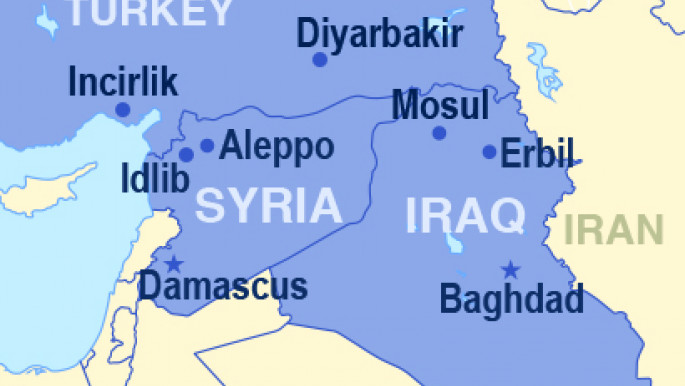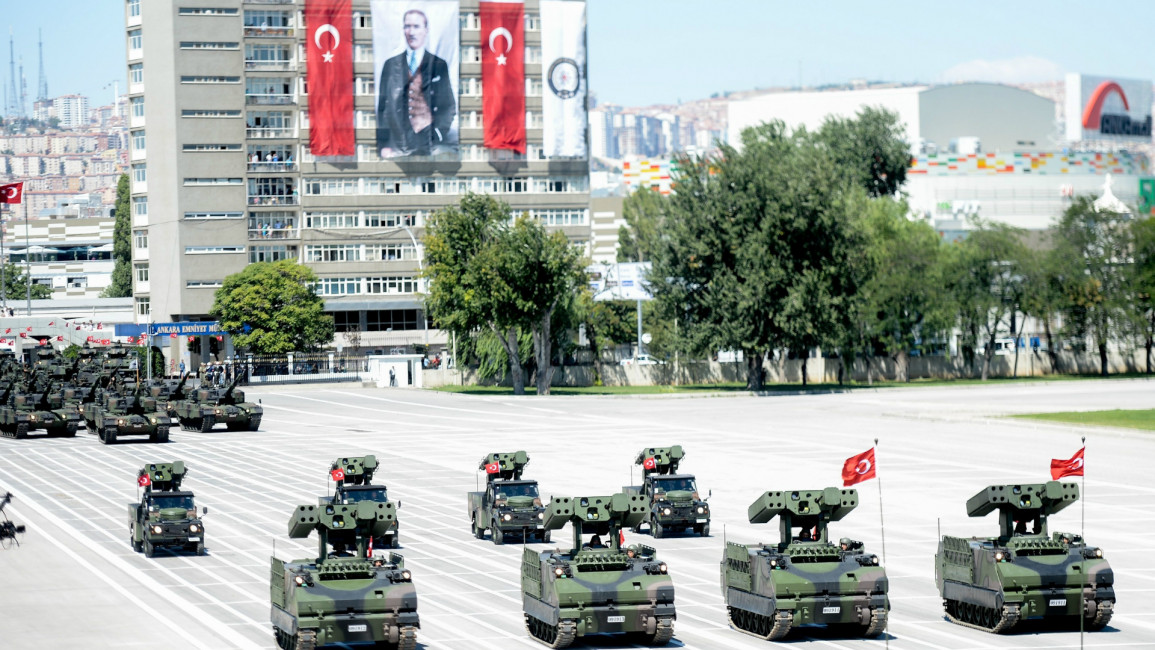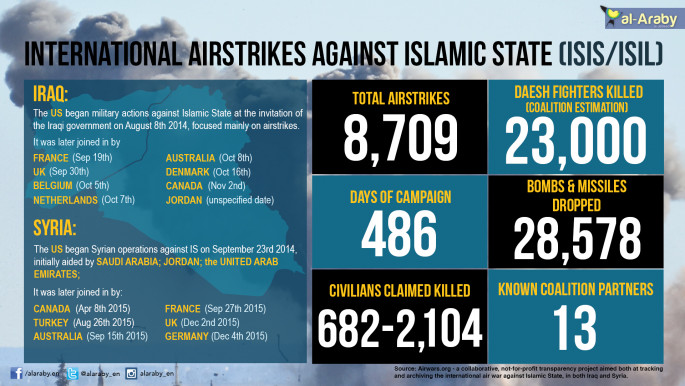Turkey unfazed by Iraqi threats
Turkey unfazed by Iraqi threats
Ankara appears not to be concerned by Baghdad's demands to withdraw troops Iraqi officials say entered the country illegally.
4 min read
Baghdad's armed forces are no match for Turkey's [Anadolu]
Turkey seems unconcerned by Baghdad's demands to withdraw troops from Iraq.
Ankara appears to be largely ignoring Iraqi officials, who on Monday said only 24 hours remained from the 48 hours Turkey had been given to pull out forces which had "entered the country illegally".
"The air force has the capability... to protect Iraq and its borders from any threat it faces," said Iraqi Prime Minister Haidar al-Abadi.
But despite Abadi's tough talk, as he struggles to assert Iraq's sovereignty while receiving foreign assistance against the Islamic State group, Baghdad's air force is hopelessly outmatched by Turkey's, and its realistic recourse is limited to diplomacy.
A senior Turkish official said on Monday that Ankara was unlikely to withdraw its troops, which number between 150 and 300 soldiers, backed by 20 tanks, deployed to a base in the Bashiqa area, near Mosul, the hub of IS operations in Iraq.
"We expect them to remain," the official said, though "it will depend on discussions."
Abadi said that Iraq had previously received "requests from Arab and regional states for their troops to join the war alongside the Iraqi forces, but we refused to allow any of them in".
Iraq does not want to be "transformed into an arena for regional conflicts", he said.
Turkey's military
In practical terms, Iraq's options are primarily diplomatic, as its forces are tied down battling IS militants - and Ankara has a far more powerful military than Baghdad.
Turkey has troops at a base in the Bashiqa area in Nineveh province to train Iraqi Sunni volunteers hoping to retake the nearby city of Mosul, which IS seized along with large parts of the country in June 2014.
Kurdistan Regional Government spokesman Safeen Dizayee has said the Turkish forces were part of the US-led international coalition against IS.
"At the end of last year, Turkey set up two bases to train Peshmerga forces in Soran and Qalachwalan. At the same time [Turkey] opened another base to train Iraqi government forces in Nineveh province, through these bases it has provided military aid," Dizayee said in a statement.
Turkish Prime Minister Ahmet Davutoglu sent a letter to Abadi on Sunday to update him about "the training programme we have been implementing in Bashiqa since last March as well as tasks and activities of our forces there", a source in his office said.
Davutoglu said in the letter that "there will be no deployment of forces to Bashiqa until the sensitivities of the Iraqi government are addressed", the source said.
A day earlier, Davutoglu downplayed the deployment as "routine rotation activity" associated with the training effort, and as "reinforcement against security risks".
"This is not a new camp," Davutoglu said.
Rather, it is a pre-existing "training facility established to support local volunteer forces' fight against terrorism", set up in coordination with the Iraqi defence ministry, he said.
But Iraq's autonomous Kurdish region, which has forces in the area, said that Turkey had sent military experts and supplies to expand the base.
Iraqi Defence Minister Khaled al-Obeidi also asked for the forces to be withdrawn in a telephone call with his Turkish counterpart, Ismet Yilmaz, the ministry said on Sunday.
According to the statement, Yilmaz said the forces were sent to protect Turkish trainers, but Obeidi said they were more than the numbers required for that task.
Hama Amin, a member of the Kurdistan Alliance, told al-Araby al-Jadeed's Iraq correspondent, Othman Mukhtar, that the Turkish forces were providing support for the war against IS and their role was limited to "logistic support, training Peshmerga forces and anti-IS fighters in Mosul".
Baghdad's relations with Turkey had recently improved but remained strained by Ankara's relationship with Iraq's autonomous Kurdish region and differences over the Syrian civil war.
Abadi has repeatedly said Iraq needs all the help it can get to fight IS, but he is also walking a fine line between receiving that support and protecting his country's sovereignty.
Plans to try to retake Mosul last spring were side-lined as the extremist group advanced on other fronts.
Sunni fighters in Nineveh and western Anbar province say the Shia-dominated government has failed to provide them with the support and weaponry needed to defeat the IS group.
The government fears that arming Sunni tribes and militias could backfire. Sunni grievances were a key factor fuelling the rise of the IS group, and many Sunnis initially welcomed the extremists as liberators.
Ankara appears to be largely ignoring Iraqi officials, who on Monday said only 24 hours remained from the 48 hours Turkey had been given to pull out forces which had "entered the country illegally".
"The air force has the capability... to protect Iraq and its borders from any threat it faces," said Iraqi Prime Minister Haidar al-Abadi.
But despite Abadi's tough talk, as he struggles to assert Iraq's sovereignty while receiving foreign assistance against the Islamic State group, Baghdad's air force is hopelessly outmatched by Turkey's, and its realistic recourse is limited to diplomacy.
A senior Turkish official said on Monday that Ankara was unlikely to withdraw its troops, which number between 150 and 300 soldiers, backed by 20 tanks, deployed to a base in the Bashiqa area, near Mosul, the hub of IS operations in Iraq.
"We expect them to remain," the official said, though "it will depend on discussions."
Abadi said that Iraq had previously received "requests from Arab and regional states for their troops to join the war alongside the Iraqi forces, but we refused to allow any of them in".
| Read also: Iraqi militias - Turkish interests in Iraq now 'legitimate targets' |
Iraq does not want to be "transformed into an arena for regional conflicts", he said.
Turkey's military
In practical terms, Iraq's options are primarily diplomatic, as its forces are tied down battling IS militants - and Ankara has a far more powerful military than Baghdad.
Turkey has troops at a base in the Bashiqa area in Nineveh province to train Iraqi Sunni volunteers hoping to retake the nearby city of Mosul, which IS seized along with large parts of the country in June 2014.
Kurdistan Regional Government spokesman Safeen Dizayee has said the Turkish forces were part of the US-led international coalition against IS.
 |
"At the end of last year, Turkey set up two bases to train Peshmerga forces in Soran and Qalachwalan. At the same time [Turkey] opened another base to train Iraqi government forces in Nineveh province, through these bases it has provided military aid," Dizayee said in a statement.
Turkish Prime Minister Ahmet Davutoglu sent a letter to Abadi on Sunday to update him about "the training programme we have been implementing in Bashiqa since last March as well as tasks and activities of our forces there", a source in his office said.
Davutoglu said in the letter that "there will be no deployment of forces to Bashiqa until the sensitivities of the Iraqi government are addressed", the source said.
A day earlier, Davutoglu downplayed the deployment as "routine rotation activity" associated with the training effort, and as "reinforcement against security risks".
"This is not a new camp," Davutoglu said.
Rather, it is a pre-existing "training facility established to support local volunteer forces' fight against terrorism", set up in coordination with the Iraqi defence ministry, he said.
But Iraq's autonomous Kurdish region, which has forces in the area, said that Turkey had sent military experts and supplies to expand the base.
Iraqi Defence Minister Khaled al-Obeidi also asked for the forces to be withdrawn in a telephone call with his Turkish counterpart, Ismet Yilmaz, the ministry said on Sunday.
According to the statement, Yilmaz said the forces were sent to protect Turkish trainers, but Obeidi said they were more than the numbers required for that task.
Hama Amin, a member of the Kurdistan Alliance, told al-Araby al-Jadeed's Iraq correspondent, Othman Mukhtar, that the Turkish forces were providing support for the war against IS and their role was limited to "logistic support, training Peshmerga forces and anti-IS fighters in Mosul".
Baghdad's relations with Turkey had recently improved but remained strained by Ankara's relationship with Iraq's autonomous Kurdish region and differences over the Syrian civil war.
Abadi has repeatedly said Iraq needs all the help it can get to fight IS, but he is also walking a fine line between receiving that support and protecting his country's sovereignty.
Plans to try to retake Mosul last spring were side-lined as the extremist group advanced on other fronts.
Sunni fighters in Nineveh and western Anbar province say the Shia-dominated government has failed to provide them with the support and weaponry needed to defeat the IS group.
The government fears that arming Sunni tribes and militias could backfire. Sunni grievances were a key factor fuelling the rise of the IS group, and many Sunnis initially welcomed the extremists as liberators.



![Hundreds demonstrate against the White House Correspondents' Dinner in support of Gazan journalists. [Brooke Anderson/TNA]](/sites/default/files/styles/image_212x120/public/2024-04/5cde0bce-4652-4e28-a001-f06b9b8f8e28.jpg?h=ddb1ad0c&itok=KpFyfV2a)
